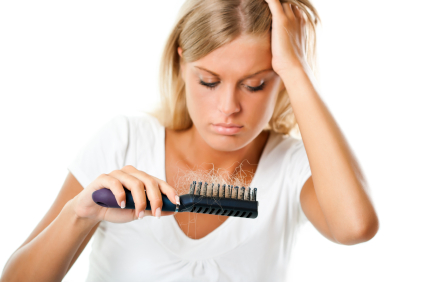Hair Loss
 Baldness implies partial or complete lack of hair. Balding is part of the wider topic of “hair thinning”. The degree and pattern of baldness can vary greatly, but its most common cause is male and female pattern baldness, also known as androgenic alopecia,alopecia androgenetica or alopecia seborrheica – an alternative term used primarily in Europe.
Baldness implies partial or complete lack of hair. Balding is part of the wider topic of “hair thinning”. The degree and pattern of baldness can vary greatly, but its most common cause is male and female pattern baldness, also known as androgenic alopecia,alopecia androgenetica or alopecia seborrheica – an alternative term used primarily in Europe.
Pattern balding should not be confused with alopecia areata, which commonly involves patchy hair loss. Extreme forms of alopecia areata are alopecia totalis, which involves the loss of all head hair, and the most extreme form, alopecia universalis, which involves the loss of all hair from the head and the body. < Definition from WIKI>
What kind of Symptoms in Hair Loss?
It is generally accepted that each person has between 100,000 and 150,000 hairs on their head (blondes have the most, followed by brunettes and redheads). Advice about how many strands it is normal to lose per day varies, but recent studies suggest an average of 100. In order to maintain a normal volume it must be replaced at the same rate. The first signs of hair thinning that people will often notice are more hairs than usual left in their hairbrush after brushing, or in the basin after shampooing. Styling can also reveal areas of thinning, such as a wider parting or thinning crown.
A substantially blemished face, back and limbs could point to cystic acne. The most severe form of the condition, cystic acne arises from the same hormonal imbalances that cause hair loss, and is associated with DHT production. Seborrheic dermatitis, a condition in which an excessive amount of sebum is produced and builds up on the scalp (looking like an adult cradle cap) is also a symptom of hormonal imbalances, as is an excessively oily or dry scalp. Both can cause hair thinning.
Acupuncture & Hair Growth
According to Eastern medicine, the quality of the hair relates to the sufficient amount of qi, blood and kidney energy within the body. The kidneys control the nourishment of the hair. When the body has an insufficiency of qi, blood and kidney energy, hair loss results. Acupuncture improves qi and blood flow within the body, strengthening the kidneys and promoting healthy hair growth. Applying acupuncture directly to the scalp stimulates blood flow, which stimulates new hair growth and less hair loss.(source)
